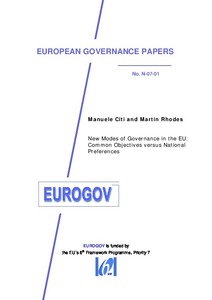New modes of governance in the EU: common objectives versus national preferences
"The emergence in the European Union of new modes of governance (NMG) such as the Open Method of Coordination (OMC) has produced an enormous literature that falls into four broad categories: a theoretical approach seeks to explain why such methods emerged and locates them in existing theories o...
| Main Authors: | , , |
|---|---|
| Institution: | ETUI-European Trade Union Institute |
| Format: | TEXT |
| Language: | English |
| Published: |
Vienna
2007
Eurogov |
| Subjects: | |
| Online Access: | https://www.labourline.org/KENTIKA-19133373124919515559-New-modes-of-governance-in-the.htm |
| _version_ | 1771659899008188416 |
|---|---|
| author | Eurogov Citi, Manuele Rhodes, Martin |
| author_facet | Eurogov Citi, Manuele Rhodes, Martin |
| collection | Library items |
| description | "The emergence in the European Union of new modes of governance (NMG) such as the Open Method of Coordination (OMC) has produced an enormous literature that falls into four broad categories: a theoretical approach seeks to explain why such methods emerged and locates them in existing theories of European integration, policy-making and institutional change; a strongly normative approach extols the non-hierarchical, deliberative virtues of NMG and ‘soft’ law and prioritizes the potential of the OMC as a font of ‘social learning’; a more empirical approach assesses new modes in operation across different policy areas and countries; and a more critical approach assesses the claims made on the OMC’s behalf as an effective instrument of policy making. Apart from our concern to critically review this literature, our aim is also to focus in on one of its greatest deficiencies: the absence, hitherto, of a comprehensive, multi-level framework for analysis, capable of specifying the conditions under which OMC practices are likely to produce a convergence of member state policies on common objectives. In doing so we also bring into our account a parallel literature – on policy diffusion and learning – that is frequently referred to by studies of the OMC and other new modes of governance but is rarely integrated systematically into their analysis." |
| format | TEXT |
| id | 19133373124919515559_cdb5b2ee1c5149ba94de9048524c2b86 |
| institution | ETUI-European Trade Union Institute |
| is_hierarchy_id | 19133373124919515559_cdb5b2ee1c5149ba94de9048524c2b86 |
| is_hierarchy_title | New modes of governance in the EU: common objectives versus national preferences |
| language | English |
| physical | 29 p. Digital |
| publishDate | 2007 |
| publisher | Vienna Eurogov |
| spellingShingle | Eurogov Citi, Manuele Rhodes, Martin EU policy European Union governance open method of coordination Lisbon strategy New modes of governance in the EU: common objectives versus national preferences |
| thumbnail | https://www.labourline.org/Image_prev.jpg?Archive=111756893993 |
| title | New modes of governance in the EU: common objectives versus national preferences |
| topic | EU policy European Union governance open method of coordination Lisbon strategy |
| url | https://www.labourline.org/KENTIKA-19133373124919515559-New-modes-of-governance-in-the.htm |

